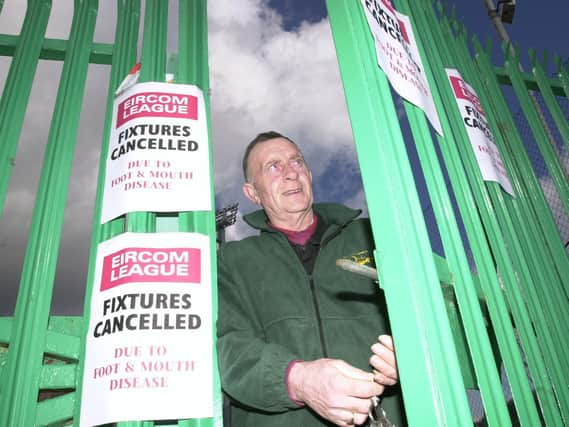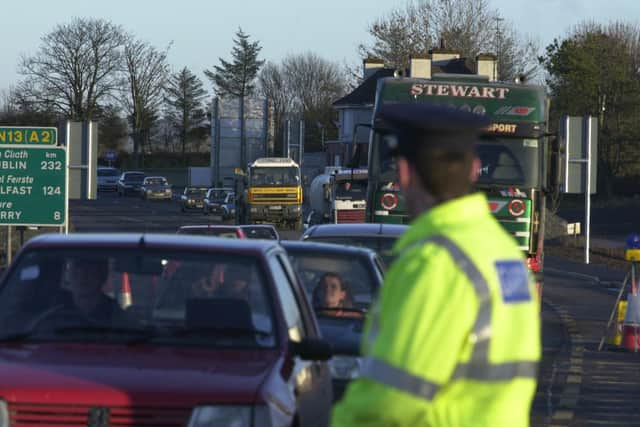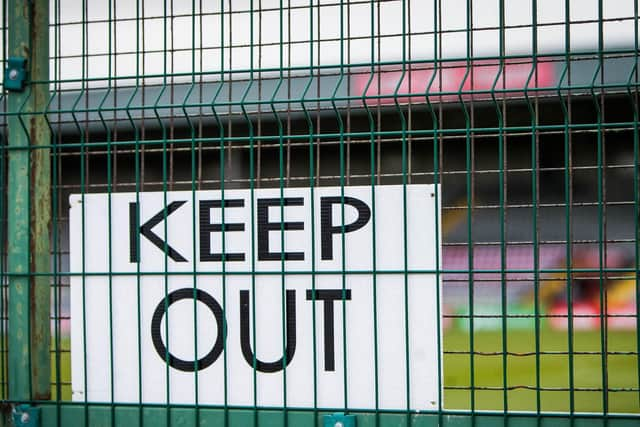How Derry City survived the Foot and Mouth crisis of 2001


While on a different scale entirely from today’s coronavirus public health crisis which is currently threatens and costing human lives, there are nonetheless striking parallels between this lockdown and the animal health crisis which threatened livelihoods and livestock.
Derry City had defeated Kilkenny 1-0 on February 23rd 2001 before the entire Eircom League programme was brought to a sudden halt with widespread social restrictions imposed on all sporting activity.
Advertisement
Hide AdAdvertisement
Hide AdThere was an unprecedented disruption, uncertainty and health and economic fears as the government cautiously drip-fed information to an anxious public while travel restrictions were imposed.


Ireland’s Six Nations match in Cardiff on February 27th was called off while horse racing called a blanket ban on all activity. Other sports quickly followed suit with the GAA and the FAI abandoning all fixtures as the epidemic spread to Northern Ireland from the UK.
The Irish government took swift action as the Garda monitored 141 roads across a 253 miles border between north and south, ensuring people and vehicles were disinfected.
The cancellation of the League of Ireland had threatened devastating financial implications for Derry City Football Club. The backlog of fixtures, a lack of income and the inability to pay wages plunged the future of many League of Ireland clubs into disarray.
Advertisement
Hide AdAdvertisement
Hide AdThe Candy Stripes’ game against UCD was the first home gate to fall victim to the crisis on March 3rd as the governments, north and south, worked hand in hand to limit the movement of people and animals in an effort to contain the disease.


A previous outbreak in 1941 had caused major difficulties but for the League of Ireland clubs in 2001, it was feared any lengthy ban would bring serious financial consequences.
Initially the Foylesiders claimed a timely fundraising campaign would help see them through the difficulties.
“With players having to be paid wages whether they play or not, this brings huge difficulties with no money coming in through the turnstiles,” commented Derry’s Commercial Director, Mr Jim Roddy at the time the crisis struck these shores.
Advertisement
Hide AdAdvertisement
Hide Ad“Contracts must be honoured but, thankfully, at Derry City our recent fundraising campaigns will help us through the difficulties.
"Obviously we moved money aside for a rainy day but depending on how long the current ban lasts, that fund will be used to keep us going. Had this happened last year we would have been in serious trouble and I don’t know if the club would have been able to survive.”
Indeed, the previous year the club had debts in excess of £120,000 before money-spinning friendlies against Celtic and Man United dug them out of trouble.
No one knew how long the impasse would last, however, with Foot and Mouth outbreaks at an alarmingly high level across the Channel, the Irish government had no intention of lowering their guard due to the enormous risk factor regarding the agricultural industry in the south.
Advertisement
Hide AdAdvertisement
Hide AdPFAI Secretary at the time, Mr Fran Gavin, confirmed the crisis was showing no signs of coming to a conclusion and therefore the association agreed to an eight week suspension in wages for part-time footballers in the Eircom League at a meeting with player delegates in Dublin’s Liberty Hall.
However, clubs employing full-time professionals were expected to pay wages in full despite the epidemic. The majority of an estimated 50 full-timers were attached to Dublin clubs. Indeed, Bohemians, St Patrick’s Athletic and Shelbourne plus Cork City, Sligo Rovers and Finn Harps all had full-time pros on their books and the PFAI insisted that those individuals must be paid.
Derry City did not have full-time players therefore the payment of wages were suspended, news which was confirmed by director, Mr Roddy in an interview in the ‘Journal’ on March 13th.
“Basically it’s a situation which has been forced upon the league following the cancellation of fixtures. Very few part-time clubs can afford to pay out wages with no money coming in. I think the players have accepted that facet and agreed to a suspension of wages for a period of eight weeks,” said the Derry City commercial Director.
Advertisement
Hide AdAdvertisement
Hide AdIn contrast to that situation two decades ago, Derry City Football Club, as a full-time professional club, were in a position to pay all their players’ wages through the Covid-19 pandemic’s initial lockdown and right until the end of the season in 2020 while many others were forced to temporarily lay off their entire playing staff.
Once again, Derry’s geographical location put the Brandywell club’s future in jeopardy in 2001 as the Republic of Ireland did all it could to stop the disease from spreading across the border and affecting an industry which made up a staggering 33% of the north’s Gross Domestic Product!
However, the club were grateful the FAI placed a ban on the entire programme and not just clubs situated in the affected areas.
Despite this and the fact clubs were facing a fixture backlog and financial difficulties, Mr Roddy called for the 2000-2001 Eircom League season to be called off immediately due to the Foot and Mouth crisis.
Advertisement
Hide AdAdvertisement
Hide AdMr Roddy said it was his personal view and didn’t represent the official opinion of the club but claimed that by not taking a decision, ‘we are only postponing the inevitable.’
“The Irish government has taken the lead in advising that all major sporting events be cancelled if only to halt the movement of large numbers of people throughout the country,” said Mr Roddy.
“That advice has been heeded by the vast majority of sporting organisations as the government does all in its power to stop the spread of Foot and Mouth Disease reaching the Republic,” he added.
Mr Roddy was adamant that having attended meetings in Dublin recently the re-commencement of the Eircom League looked ‘very far off’.
Advertisement
Hide AdAdvertisement
Hide Ad“If the league was to recommence next weekend, the season would have to be extended by three weeks in order for us to complete our programme. And that situation would bring many problems for many clubs.
“Contractual difficulties arise in that so many players are out of contract on May 1st next and that, plus the fact that players and officials have already made holiday arrangements for June and July, makes matters even more difficult,” he declared. “There are too many ramifications involved, too many difficulties that the League would find very hard to overcome.”
But if that proved to be the case what teams, if any, would qualify for European football the following season and more importantly what decision would the league make regarding relegation to the First Division and promotion to the Premier Division?
Mr Roddy openly agreed that major difficulties would have to be overcome regarding such questions.
Advertisement
Hide AdAdvertisement
Hide Ad“Personally I believe the teams currently in the Premier Division would remain there for another season and at the same time promotion should not take place as the season would not have been completed.
“As regards European football, the teams at the top of the table at this point in time should be allowed to qualify, however, a significant proportion of the finances gathered by those clubs should be spread throughout the league next season,” he suggested.
“If the Irish government relaxed their policy on the Foot and Mouth issue by permitting sporting events to take place and, for example, a case was confirmed south of the border due to such an action, I don’t think the government would remain in power too long,” claimed the Derry Director. “There’s too much at stake.”
Roddy also agreed his club’s geographical location north of the border had been a worry.
Advertisement
Hide AdAdvertisement
Hide Ad“Our position has been discussed but, in total fairness to the Eircom League, a decision has been made that if one match was cancelled then the entire program goes.
"The clubs have stood shoulder to shoulder. From a Derry City point of view we’re delighted that the league has adopted such a stance and we’re content that the ban has gone right across the board and not just in selected areas.”
“I personally feel the league should end now. I cannot see the season being extended throughout the summer for the reasons I’ve already mentioned and if there was a case for summer football then surely this is it,” he concluded.
The League of Ireland eventually resumed on March 22nd, a four week period which is in stark comparison to the almost five month’s delay in play during the 2020 Airtricity League campaign and a 12 month absence of supporters.
Advertisement
Hide AdAdvertisement
Hide AdThe entire 33 game campaign was eventually played to a finish, Bohemians clawing back an eight point deficit in the final eight games to win the league after the extended break.
While Derry finished that tumultuous season in sixth place they also had a say in the destination of the title as a 3-3 draw with Shelbourne proved costly for the Dubliners with rivals Bohs pipping them on the final day.
It was an eventful campaign for the Candy Stripes who managed to come through both a financial crisis and health crisis to maintain their position in the top flight of the League of Ireland.
Those who do not remember the past are condemned to repeat it and lessons can be learned from the 2001 outbreak on how to rebuild and build resilience after devastating social and financial loss.
Advertisement
Hide AdAdvertisement
Hide AdFollowing the expiration of the incubation period of 30 days from the only case of the disease in the Republic, the EU finally declared the country free of Foot & Mouth on April 19th as normality resumed.